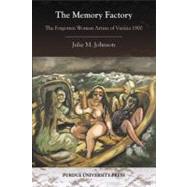The Memory Factory
, by Johnson, Julie M.- ISBN: 9781557536136 | 1557536139
- Cover: Paperback
- Copyright: 5/15/2012
The Memory Factoryintroduces an English-speaking public to the significant women artists of Vienna at the turn of the twentieth century, each chosen for her aesthetic innovations and participation in public exhibitions. These women played important public roles as exhibiting artists, both individually and in collectives, but this history has been silenced over time. Their stories show that the city of Vienna was contradictory and cosmopolitan: despite men-only policies in its main art institutions, it offered a myriad of unexpected ways for women artists to forge successful public careers. Women artists came from the provinces, Russia, and Germany to participate in its vibrant art scene. However, and especially because so many of the artists were Jewish, their contributions were actively obscured beginning in the late 1930s. Many had to flee Austria, losing their studios and lifework in the process. Some were killed in concentration camps. Along with the stories of individual women artists, the author reconstructs the history of separate women artists' associations and their exhibitions. Chapters covering the careers of Tina Blau, Elena Luksch-Makowsky, Helene Funke, and Teresa Ries (among others) point to a more integrated and cosmopolitan art world than previously thought; one where women became part of the avant-garde, accepted and even highlighted in major exhibitions at the Secession and with the Klimt group. "This is an excellent addition to the literature on fin-de-siecle Vienna, well-researched and well-argued. It highlights little-known artists and situates them in a novel interpretation of women's roles in the art world. The author challenges dominant tropes of feminist historiography and thus sheds new light on twentieth-century art history and historiography," Michael Gubser, James Madison University.







